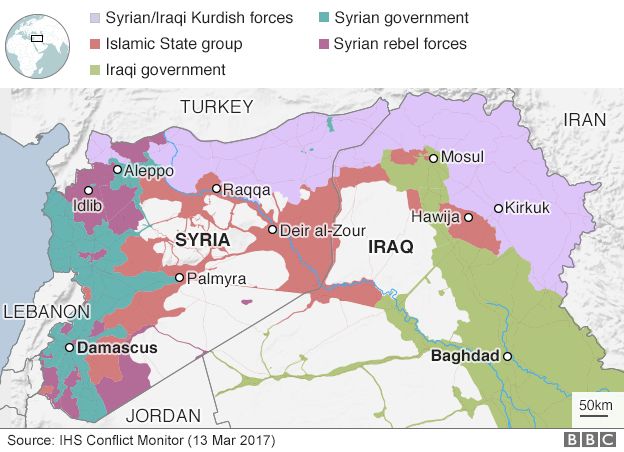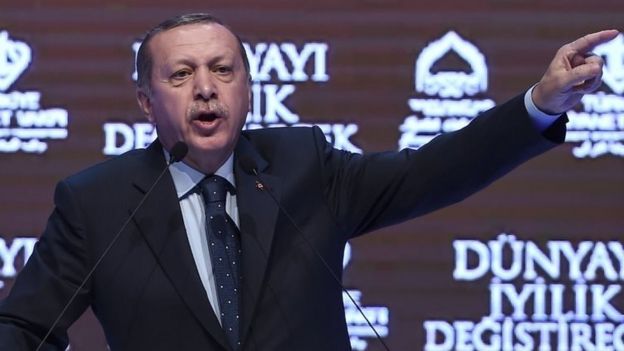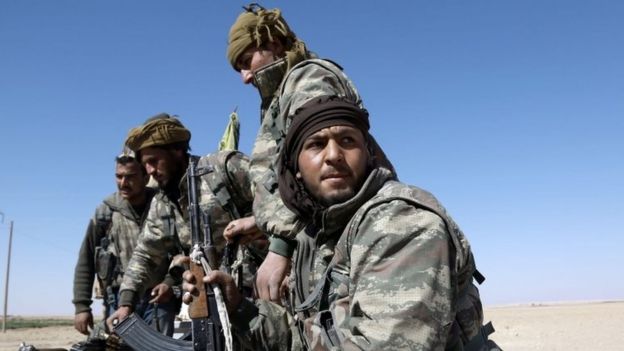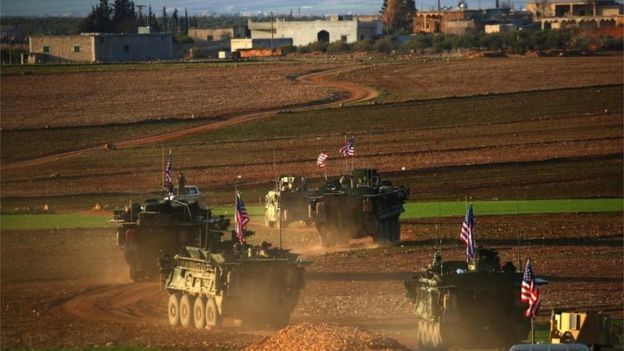Syria conflict: Unravelling the puzzle
Syria conflict: Unravelling the puzzle
With Iraqi forces gradually gaining the upper hand against so-called Islamic State (IS) in Mosul, the focus is shifting to the assault upon the organisation's de facto capital in Syria - Raqqa.
Units are being moved into position. The US has deployed a small contingent of artillery to ensure that firepower is available on tap, irrespective of any bad weather that might hamper air operations.
There's a growing sense that IS is on the defensive; the boundaries of its "caliphate" are shrinking and one phase of its story may be coming to an end.
But an end could also be a beginning.
The disintegration of IS as a territorial entity is one thing. But its ideology remains.
IS could turn back into an insurgency, feeding off the continuing chaos, instability and sectarian tensions in both Iraq and Syria. Especially in Syria it will have rivals, in groups linked to al-Qaeda.
Constellation of forces
But the likelihood of stability is remote, whatever happens in Raqqa, not least because the struggle in Syria is now dominated by powerful regional players with nobody offering an inclusive or coherent plan for the future, least of all the Americans, who appear largely sidelined.
For all President Donald Trump's campaign promises of a new onslaught against IS, all the signs are that whatever new thinking may eventually come from the White House, Mr Trump's policy will essentially be a reinforced version of that pursued by the previous administration.
Indeed, if anything, the priority given to the "defeat" of IS (whatever the term "defeat" may actually mean) suggests that the Trump team will press ahead with as little a plan for the future stability of Syria as did its predecessor.
And, if anything, the environment facing the Trump administration is getting even more complex.

The strategic map in Syria has changed significantly.
Russia's intervention and the Syrian government's recapture of Aleppo suggests that while President Bashar al-Assad rules over a fractured rump of his country, his position is secure for now. The various opposition groups are too divided and too weak to do much about this.
Russian air power was backed up by Iranian and Shia militia firepower on the ground, making Tehran a considerable player in Syria.
And Turkey's intervention in the north, to push back IS, but principally to constrain the emergence of any Kurdish entity along its border, has underscored Ankara's stake in the country.
So internal and external actors are now bound together in the struggle in a way which makes the future of Syria the centrepiece of a much broader regional struggle where outside players do not just arm the various factions - as they did during the earlier phase of the Syrian fighting - but who through their own troops or proxy militias are directly engaged on the ground.
This is the constellation of forces in Syria with which the Trump administration must contend.
It is a situation where the US remains a prominent - but not the decisive actor. And it is one where Washington risks being drawn deeper into the fighting without a clear end goal in mind.
Turkish fears
The battle for Raqqa is a case in point.
Washington and Ankara disagree as to who should mount this assault, with the US favouring its Kurdish allies, while Turkey - ever suspicious of Kurdish ambitions - prefers to see militias linked to its forces take the lead.

Joshua Landis, director of the Centre for Middle Eastern Politics at Oklahoma University and a close watcher of Syria, says it will be very difficult for Washington to allay Turkish President Recep Tayip Erdogan's fears about the Kurds.
"President Erdogan," Prof Landis told me, "is convinced that if 'Rojava' [the term Kurds use to refer to western or Syrian Kurdistan, and the name of a new federal region they want to create] comes into being, Turkey's Kurds will have a rear base from which to make a drive for their own independence.
"Mr Erdogan," he adds, "fears losing eastern Anatolia."
The complexity of the situation is best illustrated by the struggle in and around the small town of Manbij, where US Army Rangers - their vehicles flying the Stars and Stripes prominently - have been deployed to interpose themselves between Syrian Kurdish units and pro-Turkish militias.
The Turkish army itself is not far away, and small numbers of Russian troops have also reportedly entered the town guarding humanitarian convoys.
Turkish forces and their allies have already fired on Syrian government troops to the west of the town in a series of villages - originally taken by the so-called Syrian Democratic Forces alliance - but subsequently handed over by them to President Assad's forces in the hope of stemming the Turks' advance.

If President Trump is serious and in a hurry to destroy IS, Prof Landis told me, "he will have to push ahead with the allies he has".
"They are the Kurdish-led Syrian Democratic Forces, which do have Arab contingents but are led by the YPG [Popular Protection Units militia], whose overriding goal is to secure autonomy for Syria's Kurds."
Kurdish commanders are eager to help the US against IS, not least because they want to win US help in training and equipping their forces.
In political terms, says Prof Landis, the Kurds are eager "to capture large chunks of Syrian territory now held by IS to trade them with the Assad government for accommodation over Kurdish autonomy".
Assad-Kurdish deal?
Around Manbij this is already happening.
So what chance is there of the Kurds getting some kind of deal?
President Assad too is not happy about the Kurds in Syria breaking away.
But the Syrian government army is weak and exhausted. Much of it has disintegrated into militias run by local strongmen.

As Prof Landis notes: "The likelihood that Assad can prevail against the Kurds is small, especially if they have US backing. Russia, too, is looking to strike a deal between the Kurds and Assad. Thus, the chances of some sort of accommodation between Assad and the Kurds are good."
This, of course, represents a significant challenge to Turkey which already controls a swathe of territory in northern Syria.
But Prof Landis does not believe that the Turks will try to hold onto this land permanently.
"Turkey," he says, "will use its Syrian rebel army for leverage against both the Kurds and Assad. Its primary interest is to limit Kurdish independence and military help to Turkey's Kurds."
And "if it can trade Syrian land to Assad and Russia for dependable guarantees that Syria's Kurds will not be able to build a contiguous Kurdish state, it will," he adds.
Ongoing struggle
Russia, of course, is a strong defender of Syria's territorial integrity.
Squaring the circle of Kurdish demands, Moscow's backing for Damascus, and Washington's struggles with Ankara will not be easy.
But in the long term, Prof Landis believes that some kind of "Kurdish autonomous entity might eventually be possible, within a sovereign Syria, much as the US has insisted for the Kurds in Iraq".
None of this suggests that the battle for Raqqa is likely to be the end game in Syria's bitter civil wars.
The struggle for Syria is ongoing.
Russia (as advocate of the Syrian regime), Turkey and Iran remain the key diplomatic players, with the US and its Gulf Arab allies pushed uneasily to the sidelines.
President Trump's focus on destroying IS is only a partial answer to a much wider regional problem which only a broadly based diplomatic solution can address.
http://www.bbc.co.uk/news/world-middle-east-39284722
With Iraqi forces gradually gaining the upper hand against so-called Islamic State (IS) in Mosul, the focus is shifting to the assault upon the organisation's de facto capital in Syria - Raqqa.
Units are being moved into position. The US has deployed a small contingent of artillery to ensure that firepower is available on tap, irrespective of any bad weather that might hamper air operations.
There's a growing sense that IS is on the defensive; the boundaries of its "caliphate" are shrinking and one phase of its story may be coming to an end.
But an end could also be a beginning.
The disintegration of IS as a territorial entity is one thing. But its ideology remains.
IS could turn back into an insurgency, feeding off the continuing chaos, instability and sectarian tensions in both Iraq and Syria. Especially in Syria it will have rivals, in groups linked to al-Qaeda.
Constellation of forces
But the likelihood of stability is remote, whatever happens in Raqqa, not least because the struggle in Syria is now dominated by powerful regional players with nobody offering an inclusive or coherent plan for the future, least of all the Americans, who appear largely sidelined.
For all President Donald Trump's campaign promises of a new onslaught against IS, all the signs are that whatever new thinking may eventually come from the White House, Mr Trump's policy will essentially be a reinforced version of that pursued by the previous administration.
Indeed, if anything, the priority given to the "defeat" of IS (whatever the term "defeat" may actually mean) suggests that the Trump team will press ahead with as little a plan for the future stability of Syria as did its predecessor.
And, if anything, the environment facing the Trump administration is getting even more complex.

The strategic map in Syria has changed significantly.
Russia's intervention and the Syrian government's recapture of Aleppo suggests that while President Bashar al-Assad rules over a fractured rump of his country, his position is secure for now. The various opposition groups are too divided and too weak to do much about this.
Russian air power was backed up by Iranian and Shia militia firepower on the ground, making Tehran a considerable player in Syria.
And Turkey's intervention in the north, to push back IS, but principally to constrain the emergence of any Kurdish entity along its border, has underscored Ankara's stake in the country.
So internal and external actors are now bound together in the struggle in a way which makes the future of Syria the centrepiece of a much broader regional struggle where outside players do not just arm the various factions - as they did during the earlier phase of the Syrian fighting - but who through their own troops or proxy militias are directly engaged on the ground.
This is the constellation of forces in Syria with which the Trump administration must contend.
It is a situation where the US remains a prominent - but not the decisive actor. And it is one where Washington risks being drawn deeper into the fighting without a clear end goal in mind.
Turkish fears
The battle for Raqqa is a case in point.
Washington and Ankara disagree as to who should mount this assault, with the US favouring its Kurdish allies, while Turkey - ever suspicious of Kurdish ambitions - prefers to see militias linked to its forces take the lead.

Joshua Landis, director of the Centre for Middle Eastern Politics at Oklahoma University and a close watcher of Syria, says it will be very difficult for Washington to allay Turkish President Recep Tayip Erdogan's fears about the Kurds.
"President Erdogan," Prof Landis told me, "is convinced that if 'Rojava' [the term Kurds use to refer to western or Syrian Kurdistan, and the name of a new federal region they want to create] comes into being, Turkey's Kurds will have a rear base from which to make a drive for their own independence.
"Mr Erdogan," he adds, "fears losing eastern Anatolia."
The complexity of the situation is best illustrated by the struggle in and around the small town of Manbij, where US Army Rangers - their vehicles flying the Stars and Stripes prominently - have been deployed to interpose themselves between Syrian Kurdish units and pro-Turkish militias.
The Turkish army itself is not far away, and small numbers of Russian troops have also reportedly entered the town guarding humanitarian convoys.
Turkish forces and their allies have already fired on Syrian government troops to the west of the town in a series of villages - originally taken by the so-called Syrian Democratic Forces alliance - but subsequently handed over by them to President Assad's forces in the hope of stemming the Turks' advance.

If President Trump is serious and in a hurry to destroy IS, Prof Landis told me, "he will have to push ahead with the allies he has".
"They are the Kurdish-led Syrian Democratic Forces, which do have Arab contingents but are led by the YPG [Popular Protection Units militia], whose overriding goal is to secure autonomy for Syria's Kurds."
Kurdish commanders are eager to help the US against IS, not least because they want to win US help in training and equipping their forces.
In political terms, says Prof Landis, the Kurds are eager "to capture large chunks of Syrian territory now held by IS to trade them with the Assad government for accommodation over Kurdish autonomy".
Assad-Kurdish deal?
Around Manbij this is already happening.
So what chance is there of the Kurds getting some kind of deal?
President Assad too is not happy about the Kurds in Syria breaking away.
But the Syrian government army is weak and exhausted. Much of it has disintegrated into militias run by local strongmen.

As Prof Landis notes: "The likelihood that Assad can prevail against the Kurds is small, especially if they have US backing. Russia, too, is looking to strike a deal between the Kurds and Assad. Thus, the chances of some sort of accommodation between Assad and the Kurds are good."
This, of course, represents a significant challenge to Turkey which already controls a swathe of territory in northern Syria.
But Prof Landis does not believe that the Turks will try to hold onto this land permanently.
"Turkey," he says, "will use its Syrian rebel army for leverage against both the Kurds and Assad. Its primary interest is to limit Kurdish independence and military help to Turkey's Kurds."
And "if it can trade Syrian land to Assad and Russia for dependable guarantees that Syria's Kurds will not be able to build a contiguous Kurdish state, it will," he adds.
Ongoing struggle
Russia, of course, is a strong defender of Syria's territorial integrity.
Squaring the circle of Kurdish demands, Moscow's backing for Damascus, and Washington's struggles with Ankara will not be easy.
But in the long term, Prof Landis believes that some kind of "Kurdish autonomous entity might eventually be possible, within a sovereign Syria, much as the US has insisted for the Kurds in Iraq".
None of this suggests that the battle for Raqqa is likely to be the end game in Syria's bitter civil wars.
The struggle for Syria is ongoing.
Russia (as advocate of the Syrian regime), Turkey and Iran remain the key diplomatic players, with the US and its Gulf Arab allies pushed uneasily to the sidelines.
President Trump's focus on destroying IS is only a partial answer to a much wider regional problem which only a broadly based diplomatic solution can address.
http://www.bbc.co.uk/news/world-middle-east-39284722